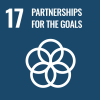Cali, 9 October 2023 – Originally from Miranda, Venezuela, Nunzia migrated two years ago to Cali, Colombia, along with her 20-year-old daughter, driven by the hope of reuniting with her two children already residing in the city.
“The moment I crossed the Arauca River, on the border between Colombia and Venezuela, I had a mix of emotions: behind me was my country and family and ahead, there was hope,” she explains.
Shortly after her joyful reunion with her children in Cali, Nunzia realized that things weren’t going as planned.
“We came here with big plans – most of us in the family were going to find work and we even had an apartment lined up,” she recalls. “Unfortunately, life threw us some curveballs and we couldn't hold onto our jobs. We ended up on the streets, and that’s when my daughter started going through a tough time with her mental health.”
Nunzia’s first encounter with the health team working with the International Organization for Migration (IOM) took place during an educational event in 2021. They played a crucial role in helping her daughter access mental health care through telemedicine, a service facilitated through an agreement with the Mental Hospital of Antioquia. Meanwhile, Nunzia was working on sorting out her immigration status and getting access to the Colombian health-care system.
“Since that day, my daughter has received her national health-care card and secured her temporary protection permit,” she says. “Initially, she wanted nothing to do with therapists, but after getting to know the hospital psychologist, she really grew fond of them.”

Nunzia participates in an interactive activity with children, teaching them a variety of fun, educational games. Photo: IOM Colombia
Nunzia attended these appointments to support her daughter. Through IOM, she met other Venezuelan women who introduced her to the Community Health Network (CHN), a close-knit support community which offers guidance and training to help fellow Venezuelans access essential health care services and take action to safeguard their health and well-being.
Nunzia immediately realized that this would be her avenue to make a meaningful impact in the world. “Meeting other Venezuelans and immersing myself in community work was incredibly rewarding,” she explains. “The way I felt helping others solidified my determination to follow my passion: working for the betterment of our communities.”
Today, Nunzia is a prominent leader with the Liderando Esperanzas (Leading Hope) CHN in Cali, where she continues to promote the mental health and psychosocial well-being of refugees, migrants and members of host communities.


A champion of mental health and community solidarity, Nunzia tries to make a difference every day. Photo: IOM Colombia
Since joining the Liderando Esperanzas network in Cali, Nunzia has discovered a supportive community that has helped her integrate into Colombia and has contributed to her overall well-being. She has also strengthened her skills and knowledge in health care to be able to support both individuals and the community as a whole. Nunzia is not alone in this journey; more than 700 CHN leaders are currently working in 18 departments across the country.
These leaders carry out Information, Education, and Communication (IEC) activities about the importance of mental health, covering various topics, including protective and risk factors, identifying and dispelling myths and misconceptions associated with mental health issues and disorders, and the importance of developing community-driven strategies for their enhancement. These efforts are designed to empower communities, boost their mental health capabilities, and foster collaboration with local health authorities and other vital stakeholders.
“I am convinced that everyone should be well-informed about mental health,” Nunzia firmly says. “It’s the foundation for everything: you’re better equipped to take actions that not only prevent physical illnesses but also foster a harmonious existence.”

The network of leaders organized activities for this year’s World Suicide Prevention Day, spreading awareness and hope in Cali. Photo: IOM Colombia
Four training sessions organized by IOM enabled more than 500 leaders like Nunzia from various health networks to learn more about the topic of mental health.
“Here in Cali, we teamed up with the Health Secretariat to structure the event around three core themes: thinking, feeling and acting,” she explains. “We set up sessions on breathing techniques and interactive games, as well as dedicated spaces where we could engage with young people about mental health, address myths to break down stigmas, and promote the national mental health hotline.”
For Nunzia, the project meant a space for learning and nurturing her sense of community service.
“I wish we could replicate this strategy every week because we need to continue the good work we started,” she says. “If we all do our part, we can make a significant impact and drive positive change. It’s very important to continue this initiative, extend it to communities, schools and institutions, and replicate it with fun and recreational activities,” she adds.
On World Suicide Prevention Day commemorated on 10 September, CHN leaders organized 31 intersectoral fairs in all 18 departments. This endeavor drew the participation of over 6,000 people from both migrant and host communities and was carried out in coordination with health authorities and various institutions.

Nunzia and her colleagues recently conducted IEC activities at a mental health fair in Cali. Photo: IOM Colombia
IOM remains unwavering in its commitment to promote actions that strengthen community leadership in mental health and access to mental health services for vulnerable communities, especially refugees, migrants and host community members in order to bridge the gap in health care access and ultimately reduce inequalities within society.
As for Nunzia, she remains deeply passionate about community work and promoting mental health: “I envision continuing my collaboration with the network in the city I affectionately call ‘Open Arms’ – Cali.”
This story was written by Paola Cumbe Guerra, IOM Communications Monitor in Colombia.
IOM's mental health and psychosocial support initiatives in Colombia are made possible with the generous support of the US Department of State's Bureau of Population, Refugees, and Migration (PRM).



